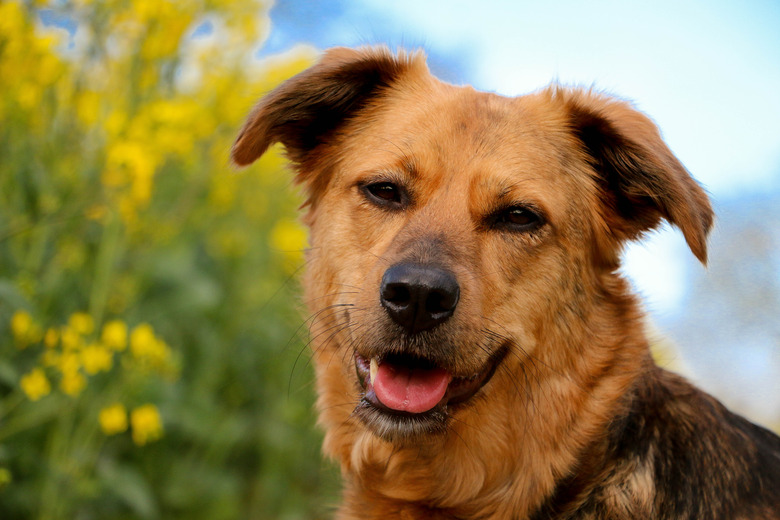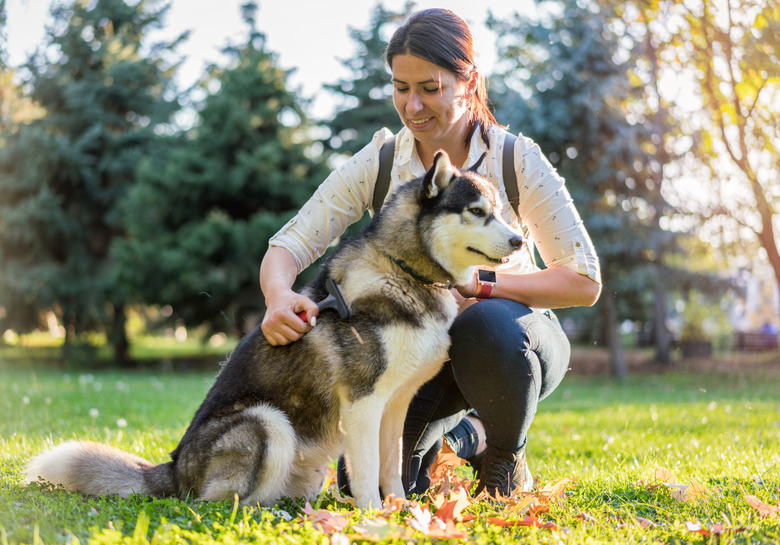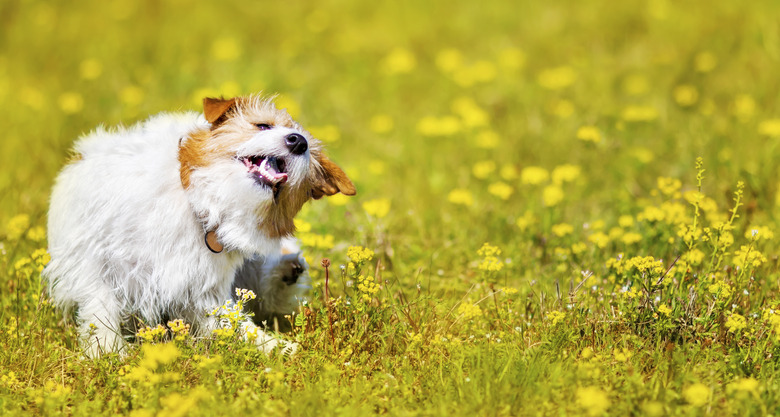Dog Itching All The Time? How To Relieve Dog Itching
Itchiness is a common dog health problem, particularly during the summer months when allergens, fleas, mosquitoes, and other pests can wreak havoc on your dog's skin. If your dog is keeping you up at night licking, chewing, and scratching or if you notice hot spots or missing patches of hair, a trip to the veterinarian is in order. A variety of treatments can help relieve dog itching.
How to relieve a dog's itchy skin
How to relieve a dog's itchy skin
There are many reasons a dog can have itchy skin, such as food allergies, environmental allergies, and a flea allergy. Relieving itching and skin irritation partly depends on the reason, so it's best to schedule an appointment with a veterinarian right away so they can determine the underlying cause of your dog's itchiness.
A lot of dogs with itchy skin and skin allergies also have dry skin. Talk with your veterinarian about dog skin products that are moisturizing and can help restore the skin's natural barrier. Sometimes, topical products like medicated creams and medicated wipes can help itchy areas that are localized. Dog breeds that have skin folds, like English bulldogs and French bulldogs, can benefit from regularly having their folds wiped out.
If your dog needs to be treated for a secondary infection, they may need to take an oral (or topical) antibiotic, an anti-fungal, or both. Your veterinarian might also prescribe fish oils, a medicated shampoo, or other anti-itch products.
Itch relief for fungal infections
Itch relief for fungal infections
If your dog has patches of skin that are greasy and fur or ears that have a strange smell, they may have a fungal infection. Your veterinarian can prescribe an anti-fungal medication. Over-the-counter antifungal shampoos are sometimes effective (don't use them in ears), but ones that are formulated specifically for a dog's skin are ideal. You may need to wash your dog with the shampoo several times over the course of a few weeks or longer. Your veterinarian will give you specific instructions.
Dog itching from allergic reactions
Dog itching from allergic reactions
There are many common things that can cause allergic reactions in your pet. There are three main categories of allergies for dogs: food, environmental allergens, and fleas. Environmental allergies are also called atopy, seasonal allergies, or airborne allergies.
If your pet is suspected to have a food allergy, your veterinarian will recommend a food trial that lasts about 12 weeks. During this time, you will only feed your dog a hypoallergenic food and nothing else. Some common food allergens are chicken, beef, lamb, and wheat.
Allergic reactions to flea bites
Allergic reactions to flea bites
If your dog has allergic reactions to flea bites, your veterinarian will prescribe preventatives to treat your dog for fleas. But your veterinarian may still need to treat any skin conditions that develop as a result of the reaction to fleas, such as a secondary skin infection. If your dog has environmental allergies, there are different treatments available, such as oral and injectable medication with anti-inflammatory properties to relieve dog itching. Your pooch may also be sent home with a topical product to put on affected areas.
If you suspect your dog is having an allergic reaction to a bug bite or a bee sting because their face is swollen and/or they have broken out in hives, consider that an emergency until proven otherwise. Take them to your veterinarian right away for treatment. If your regular pet hospital is closed, go to an emergency clinic.
Fleas and pests
Fleas and pests
Fleas, mosquitoes, and other biting insects are perhaps the most common cause of frequent scratching. Check your dog's skin and fur for fleas and small dark specks called flea dirt (flea droppings). A prescription pest control treatment can help eliminate the fleas in your immediate environment. For your dog, make sure they are on a treatment that kills both fleas and their eggs.
You will also need to remove bedding that is potentially flea-infested and vacuum areas your dog frequents to completely remove the fleas and their eggs. In some climates, year-round flea control is needed. If you live in an area with lots of mosquitoes, ask your veterinarian about a treatment that will deter mosquitoes as well. Over-the-counter flea treatments are often ineffective and may cause allergic skin reactions in some dogs.
Dogs itching from anxiety
Dogs itching from anxiety
Some dogs compulsively lick and scratch themselves because of anxiety. This can cause focal areas of hair loss and sores, such as on the front paws. Frequent exercise can help your dog burn off some of this nervous energy. A ThunderShirt may help dogs who respond to the comforting light compression of the shirt. It's similar to how a weighted blanket is comforting to some people.
However, some dogs suffer from anxiety so severe that prescription medication is in order. If your dog's anxiety is interfering with their quality of life and exercise and lifestyle changes have not worked, ask your veterinarian about prescription anxiety medication.
Are there any safe home remedies to relieve dog itching?
Are there any safe home remedies to relieve dog itching?
Yes, there are some safe home remedies, but they aren't likely to actually cure the cause of your dog's itching. Things like fleas; mites; atopy; food allergy; or secondary skin issues, like bacterial or yeast infections, require veterinary treatment. Natural remedies can sometimes be a temporary Band-Aid for irritated skin while you're waiting to get in to see your veterinarian, but it's not a good idea to use them as an attempt to cure your pet.
Common home remedies to help relieve dog itching are:
- Colloidal oatmeal baths: Colloidal oatmeal is anti-inflammatory. Make sure your pet sits in the oatmeal bath for at least 10 minutes before rinsing them off and patting them dry.
- Coconut oil: This can be applied in small amounts to focal dry spots.
- Aloe vera: You can find 100% aloe vera gel at the store and apply it to areas of irritated skin two to three times a day. Just make sure it's pure aloe and doesn't contain things like alcohol.
- Chamomile or green tea bag soaks: Depending on the size of your dog, fill your sink or tub with warm water. Steep several tea bags for five minutes and then let your dog sit in the tea water for five to 10 minutes.
- Benadryl Allergy: An over-the-counter antihistamine like Benadryl Allergy can be helpful for some dog allergy issues but may not do anything for others.
Pet parents should ask their veterinarian before giving their pet Benadryl or any home remedies. However, if your dog has an open wound, contact your veterinarian right away about how they want you to proceed.
The bottom line
The bottom line
There are many different treatment methods to help diagnose and manage allergic skin disease in pets. An itchy dog can have food allergies, environmental allergies, or flea allergies. A food allergy will require special dog food. Environmental allergies might need oral, topical, or injectable medications plus changes (if possible) in the environment. Dogs with flea infestations may need to stay on year-round preventatives. Your veterinarian may also add supplements to your dog's diet, such as omega-3 fatty acids or a probiotic. Because itchiness can quickly turn into severely inflamed and sometimes infected skin, attempts to cure your dog with a home remedy aren't recommended.





